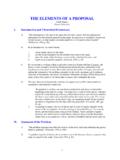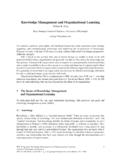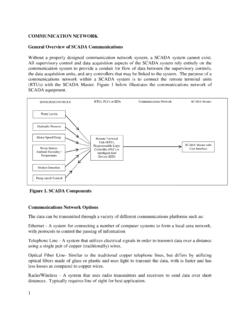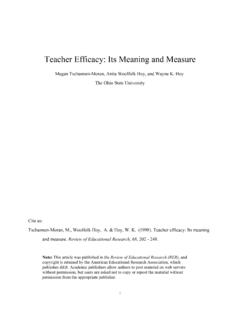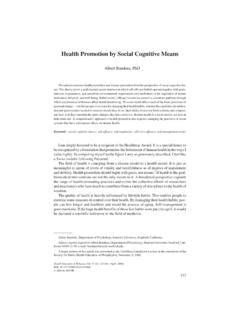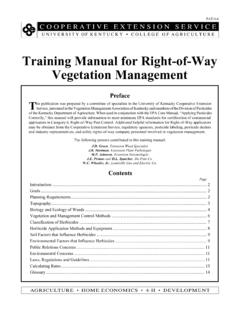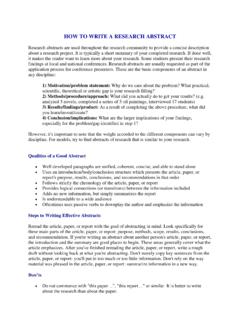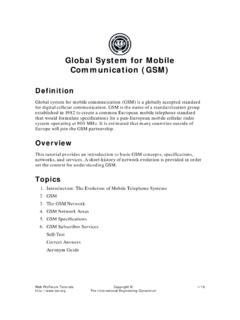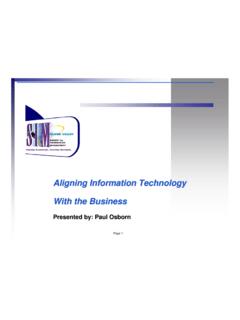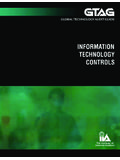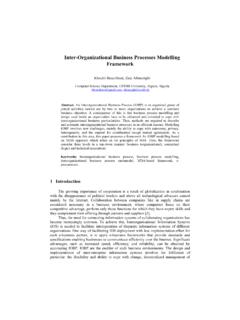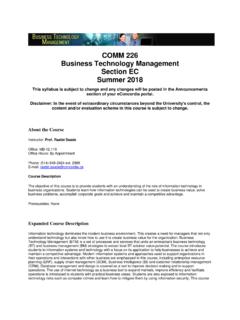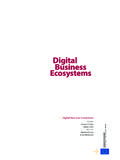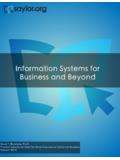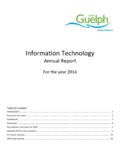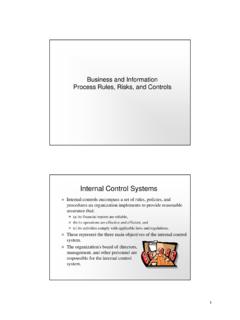Transcription of Information Technology as an Enabler of …
1 1. Information Technology as an Enabler of knowledge Management: An Empirical Analysis 2. Susana P rez L pez, Jos Manuel Montes Pe n, and Camilo Jos V zquez Ord s 3. Department of Business Administration, University of Oviedo, Avda. del Cristo, s/n 33071, Oviedo, Spain Abstract The past two decades have seen growing interest in knowledge management and the use 4. of Information technologies. However, it is not clear how the relation between IT competency and 5. knowledge management works. This study provides a better understanding of that relation. Through 6.
2 An empirical study of 162 Spanish firms, the work finds that IT competency has a direct effect on the 7. processes of knowledge management: knowledge generation, knowledge transfer, and knowledge 8. codification and storage. At the same time, IT competency also has an indirect effect on knowledge 9. management by facilitating the development of organizational structures that favor the development 10. and expansion of knowledge . These findings reinforce a field that is of increasing interest to researchers, 11. and which has seen only a limited number of empirical studies to date.
3 12. Keywords: Information Technology Competency, Organizational Learning, knowledge Management 13. 1 Introduction 14. 15. Firms are facing a competitive environment characterized by the globalization of markets, 16. increasingly complex business problems, and the acceleration of change phenomena. Consequently, 17. the traditional sources of competitive advantage, such as protected markets, and physical and 18. financial assets, have lost importance compared to knowledge assets (Foray and Lundvall, 1996; 19. Grant, 1996; Johnston and Rolf, 1998). This has contributed to the growing interest in the con- 20.
4 Cept of knowledge management in the past two decades. 21. knowledge management has emerged as a discrete area in the study of organizations and is 22. frequently cited as an antecedent of organizational performance. If organizations implement 23. knowledge management practices successfully they are able to perform intelligently to sustain 24. their competitive advantage by developing their knowledge assets (Wigg, 1999). Thus, it is 25. essential to know how to generate knowledge , how to disseminate it in the organization and what 26. factors facilitate these processes (Stewart, 1997; Davenport and Prusak, 1998).
5 27. In recent years, several researchers have associated knowledge management with the develop- 28. ment of Information and communication technologies, (ICT) (Ruggles, 1997; Scott, 2000; King, 29. 2005). The new technologies are characterized by their capacity to influence the traditional 30. ways of understanding certain organizational phenomena and behaviors and affect how organi- 31. zations tackle the challenges thrown up by the knowledge society (Duffy, 2001). Researchers 32. have gone from studying the effects of ICT on economic-financial variables to studying its comple- King (ed.)
6 , knowledge Management and Organizational Learning, 111. Annals of Information Systems 4, DOI , Springer Science+Business Media, LLC 2009. 112 knowledge Management and Organizational Learning 33 mentarity with intangible resources such as knowledge (Martin et al., 2004). But it is not clear 34 how the relation between IT competency and knowledge management works. Empirical work 35 in this area is lacking. 36 Thus, the objective of this paper is to develop a better understanding of how IT competency 37 affects knowledge management. This study proposes a theoretical model whose basic contention 38 is that the relation between IT competency and knowledge management is twofold: both direct and 39 indirect.
7 Information systems can directly influence the knowledge management processes. They 40 can also indirectly influence knowledge management by affecting contextual factors such as struc- 41 ture, which, in turn, influence knowledge management. The following sections discuss the con- 42 cepts of knowledge management and IT competency. Then, the hypotheses representing the 43 relations between IT competency, structure and knowledge management are formulated. 44 The hypotheses are tested with the structural modeling technique, using data collected from managers 45 in 162 Spanish firms.
8 The work concludes with a discussion of the results and their implications. 46 2 knowledge Management 47 Defining the concept of knowledge management is not straightforward, because this subject has 48 been studied by several disciplines and from different approaches. For example, Davenport et al. 49 (1998) defines knowledge management as a process of collection, distribution and efficient use 50 of the knowledge resource. O'Dell and Grayson (1998) see knowledge management as a strategy 51 to be developed in a firm to ensure that knowledge reaches the right people at the right time, and 52 that those people share and use the Information to improve the organization's functioning.
9 For 53 Bhatt (2001), knowledge management is a process of knowledge creation, validation, presenta- 54 tion, distribution and application. And Bounfour (2003) defines knowledge management as a set 55 of procedures, infrastructures, and technical and managerial tools, designed to create, share and 56 leverage Information and knowledge within and around organizations. 57 Although the above definitions vary in their description of knowledge management, there 58 seems to be a consensus to treat knowledge management as a set of processes allowing the use 59 of knowledge as a key factor to add and generate value (Bueno and Ordo ez, 2004).
10 60 In the conceptual framework of this work, knowledge management is composed of three 61 main processes, which are namely: knowledge generation, knowledge transfer, and knowledge 62 codification and storage. 63 knowledge generation can be defined as the process by which the firm obtains knowledge , 64 either from outside the company or generated internally (Lee and Hong, 2002; McCann and 65 Buckner, 2004). The objective is to obtain new and better knowledge that helps the organization 66 improve its competitiveness (Wiig, 1997). Thus, knowledge generation is not just about generat- 67 ing new contents, but also about replacing, validating and updating the firm's existing knowledge 68 (Alavi and Leidner, 2001; Bhatt, 2001).

